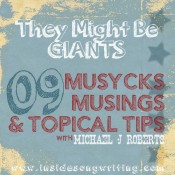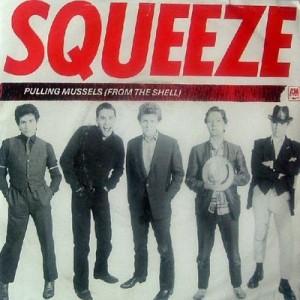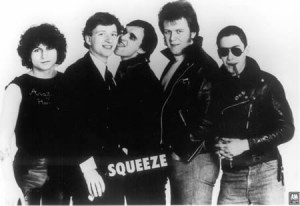Musycks Musings & Topical Tips 09: They Might Be Giants

They Might be Giants – Difford and Tilbrook, Schlesinger and Collingwood.
A weekly column by Inside Songwriting contributor, Michael J Roberts.
For young songwriters now, the maze of choice of who to investigate and learn from is vast and daunting, and at Inside Songwriting we will take the time to regularly mention writers you should know about. This weeks collection of scrambled thoughts is dedicated to the masters of songwriting who might not be mentioned in the same breath as Paul McCartney, Brian Wilson or Jimmy Webb, to the under appreciated song-smiths whose body of work or continuing excellence deserves our applause. Stand up and take a bow Chris Difford, Glenn Tilbrook, Adam Schlesinger and Chris Collingwood. (Troy McClure voice) -You may know them better from such bands as Squeeze from the UK and Fountains of Wayne from the USA. Both bands excelled in delivering ‘slice of life’ vignettes in the tradition of The Beatles’, She’s Leaving Home or Macca’s Another Day or The Kinks immortal Waterloo Sunset with plenty of their own flair and individuality.
Squeeze inveigled its way into our consciousness via the competitive, dog-eat-dog cut and thrust of the English pub scene during the Punk and New Wave era of the mid to late ‘70’s. Almost immediately the wry and observational songs of Difford and Tilbrook set them apart from their (mostly) humourless contemporaries. The humanity and scope of their wit and the tunefulness of their music certainly invoked the great Lennon and McCartney team, which became as much curse as blessing methinks. The pair seemed to unfairly bear that “new John and Paul” moniker for a long time, from lazy journalists who noticed both were songwriting teams and both were English, but there was a lot more going on for those who looked closely.
Difford and Tilbrook made an aural impression via the twin vocal attack of the pair, Difford’s low harmony countering Tilbrook’s sweet and keening tenor and in some ways their songwriting reflected the same dynamic. Chris wrote the lyrics, often favouring a wry or acerbic approach and Glenn wrote the music, often matching the words to a lilting and quasi-romantic melody. The resultant, almost paradoxical push and pull of the component elements made for a fresh and compelling take on the modern pop song, glistening melodic flair coupled with a sardonic lyric.
One of the best singles in any pop era
After denting the charts with the quasi-novelty song bounce of Cool For Cats, where the gruffer tones of Difford took centre stage as the singer, the band steadily released a string of offbeat pop gems, culminating in the sublime Tempted, in 1981, one of the best singles in any pop era. The pair were responsible for such evocative songs as Up The Junction (one of the best opening couplets in pop –“I never thought it would happen with me and the girl from Clapham” and with a fiendishly complex bridging chord sequence), the tender Vanity Fair, Goodbye Girl or Labelled With Love, which all manage to stand up next to any Kinks or Small Faces classic era single. It’s no small miracle that they can emulate in three minute songs the entire oeuvre of classic British New Wave cinema of the early 1960’s and arch observers of the English condition like directors Tony Richardson or John Schlesinger.
Difford and Tilbrook were equally adept at the gloriously fun, suitably nonsensical end of the pop spectrum too, as evidenced by the fine sonic baubles Annie Get Your Gun and Hourglass, amongst many others. The writers were also capable of real depth and emotion, Is That Love, Black Coffee in Bed, No Place Like Home and Some Fantastic Place being prime exhibits. The partnership is a throwback in some ways, to the era of the classic songbook writers of the ‘30s and ‘40s where it was common to split the duties into lyric writer and composer. Difford always wrote the lyric first and Tilbrook said he would work on the ones that attracted him, writing quickly, “..it’s always in response to the lyrics. I always write to Chris’s lyrics. And what’s more, I made a habit pretty early on of never reading lyrics he gave to me until I sat down with the guitar or piano. So first response is what interests me.” Apart from a brief sojourn as a duo, with the excellent and eponymous Difford and Tilbrook album to show for it in the early ‘80s, the pair rode through the ‘90s reminding everyone of the value of classicism in songwriting amidst a world of grunge.
All songs by Collingwood and Schlesinger
In 1996, on the other side of the Atlantic, we had a group coalesce around the songwriting axis of Chris Collingwood and Adam Schlesinger, the quirkily titled Fountains of Wayne from New York. The pair wrote separately but all albums feature a credit “All songs by Collingwood and Schlesinger” so it’s tricky to know exactly who wrote what when looking from the outside. The debut album featured the assured and catchy Radiation Vibe and Sink To The Bottom, and a highlight was the exquisite Sick Day from Collingwood. The elegance and wit evident in Sick Day is one of the finest achievements in modern American pop, at least the equal of McCartney’s Another Day or anything arch pop-meister Neil Finn has penned.
Collingwood and Schlesinger fit neatly into a continuum that incorporates such disparate American pop icons as Big Star, Harry Nilsson, Todd Rundgren and Andrew Gold, and their talent harks back to Paul Simon as much as the vaunted Brit-pop band giants of the ‘60s. It was this ability to capture a certain ‘classicism’ in their writing that led Tom Hanks to offer Schlesinger the gig to write the key ‘one hit wonder’ song for his 1996 film That Thing You Do. It’s a tribute to his ability that the result song rose above mere pastiche and had the ability to survive repeated listening in the film and stay fresh, a resultant Academy Award nomination confirmed that achievement.
The band consolidated their debut success with the very fine Utopia Parkway album in 1999, with the title track, Troubled Times and Amity Gardens (with its LA’s overtones) absolute highlights. The album was a coherent examination of the American suburban dream and its close cousin, the American Dream, and this ability to essay the ordinary reached its zenith with their best album Welcome Interstate Managers in 2003. Their catchy and energetic Stacy’s Mom, a de facto homage to The Cars, became a heavenly pop hit (helped by a sharp clip and a curvy Rachel Hunter) giving the band some much needed chart clout. A series of beautiful vignettes unfold, from the bittersweet Mexican Wine to the heartfelt Fire Island, to the gorgeous closer Yours and Mine.
The album is a masterful distillation of the American psyche post Reaganomics, where the promise of the Baby Boom generation bumped into the greed of the 1 per cent-ers. The album champions the working class stiff, in the same way that Difford and Tilbrook address the very English notion of class, so too FOW subtly allude to the unspoken reality of an American class system. They quietly essay the lives of waitresses or suburban nobodies who wonder where their slice of the American Dream might be? They resolve the question by affirming the centrality of human connection about all, of Julie waiting to give her man a shoulder rub after work, of sweet Annie meeting her love in a New England town. Valley Winter Song is a masterpiece of observational reportage, as is the exquisite Hackensack, with its deathless couplet “I saw you talkin’ to Christopher Walken” and should be required listening for anyone wondering about the quality of modern American pop music. All Kinds of Time exists in an ethereal nether world where clocks stop and hearts beat slower, no small achievement in 4 minutes and 20 seconds.
Fountains of Wayne continued the fine form with Traffic and Weather in 2007, and Sky Full of Holes in 2011, chock full of similar working class characters (Yolanda Hayes, Richie and Ruben) but never observed in a condescending way. Crucially a love for the subjects is found in all the working class vignettes from both sets of writers and it’s this empathy that elevates the content to the status of art. Difford and Tilbrook never set themselves apart from their subjects, you feel as if they are in there with them, with all their struggles and foibles. Tempted is an all time classic of observational poetry, as is Sick Day, and it’s clear an intrinsic love for the human story allows a measure of emotional, poetic investment from the writer.
There’s gold in them Schlesingers
There exists in great songwriting an affirmation of humanity and a mirrored measure of graceful connectedness. The most sublime songs illuminate the human condition; they transcend the here and now, and all four writers here have shown an ability to survey the bumpy map of the human heart and report back in clear and poetic ways. If you value a degree of ‘classicism’ in songwriting, then these writers have it in spades, the ability to work in a continuum that stretches back into the Golden Age and to take their place proudly in the first rank. In this over crowded modern world it’s necessary to go digging sometimes to find the gold, so go find and value the work of Messer’s Difford, Tilbrook, Schlesinger and Collingwood any way you can. More power to them.
Happy digging!
Musycks.
Tw: @Musycks
* Tempted is featured in full essay form in 33 Great Songs, 33 Great Songwriters Vol 1, which is available now in e-book form. Hackensack is included in Vol 2, which will be published in the next few weeks. Up The Junction and Valley Winter Song get the full treatment in the soon to be published Becoming a Great Songwriter and Sick Day is included in the forthcoming 33 Great Songs You Should Know (but probably don’t), set for late 2014.
RELATED POSTS / LINKS:
Musycks Musings & Topical Tips Home






